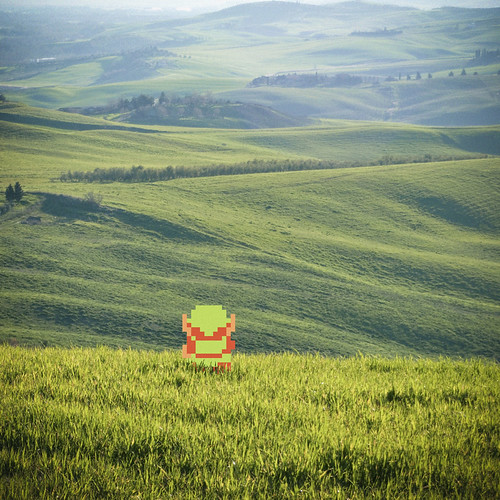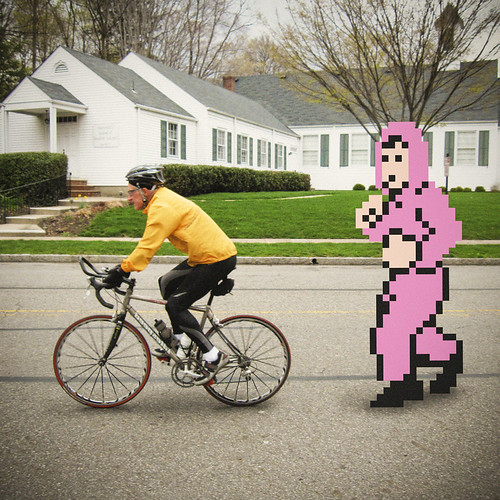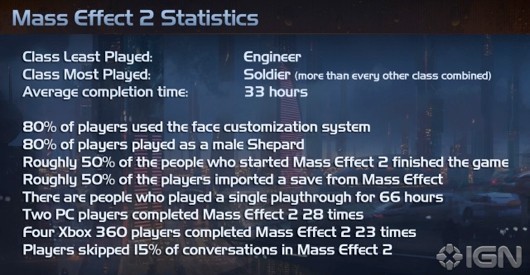Elegy for a Dead World »
I try not to post about the kickstarter campaigns I support (because there’s not enough disk space in the world for that - sorry wife!), but I’m willing to make a huge exception for this. It’s such a great idea: a game where you write the story of what you’re seeing. And then you get to share your story with other people. And you can read other people’s stories! This sounds amazing. Insta-back.
# Oct 3, 2014Baba Yetu »
If you didn’t think Civilization IV had an embarrassment of riches, last night, Christopher Tin’s ‘Baba Yetu’ – the theme song for Civ IV – became the first ever piece of music written for a videogame to ever win a grammy.
# Feb 14, 2011Death in Videogames
Kotaku - There is real death in this video game
Beloved niche PC publishers Paradox Interactive today revealed Salem, a free-to-play MMO that wants to make sure that players take their decision-making seriously. To this end, things you do in the game are promised to have a lasting effect, while more importantly, if you die, you are dead.
Your character is gone, and all your equipment is set loose for other players to grab. There is no respawning, no retention of your name or your stats or your skills. You are simply dead, and if you want to play again, you need to start all over at the beginning with a new name and a new character.
… It’s a brave decision, and one that has a far more drastic impact than in a singleplayer game, where you’re the only person who cares. In an MMO, when you die, you can be mourned.
I love this idea, and I applaud the publishers for having the balls to put out a videogame that actually deals with death in a serious way, beyond the usual “LOL I TOTALLY JUST SHOT THAT FUCKER IN THE FACE.” My only concern is with how they are planning on implementing this. When you die, will you immediately be able to start a new character? Will they ban your account for a period of time? Death only has meaning because of its permanence. It’s the ultimate full-stop. There’s no coming back. And in an MMO, the character doesn’t matter, the player matters. So the idea that a player can just roll a new character and maybe even be present for the ‘funeral’ of his previous character bothers me slightly, like it’s missing the point slightly. Why would anyone mourn a character when they know the player is still around - the same person in a different avatar?
Still, it’s a step in the right direction.
# Jan 23, 2011Videogames in the wild
Illustrator Aled Lewis has put together a series of images of videogame characters put into real-world settings, and some of them are terrific.
Check out his full Flickr stream for more.
# Jan 21, 2011Super Meat Boy
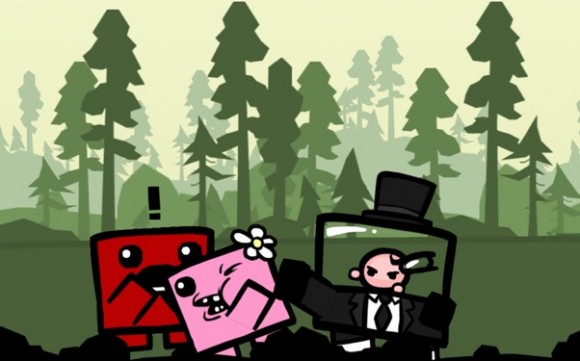
People have been calling Super Meat Boy ‘one of the hardest games ever made’. Over at GamestyleOne of the most underrated videogame blogging sites around, Bradley Marsh described it as “a game made by sadists, for masochists”.
With all due respect to Bradley, and to everyone else who has been focusing on the difficulty of Super Meat Boy, you’re wrong.
There’s no sadism involved. This isn’t a game designed to punish you. It’s not a game like Trials HD, where the pieces have been placed in an clever, but nearly-random order and you have to forcibly wrench a victory from the game, like taking a gun from Charlton Heston’s cold, dead hands. Super Meat Boy has been designed by geniuses. I haven’t finished it yet (I’m still stuck in the post-Halloween glut of gaming), but every single level I have played so far has been designed within an inch of its life so that there is one completely perfect run-through that can be achieved in the minimum amount of time, usually just a few seconds. It’s when you dawdle that the game gets difficult. In other words, if you aren’t playing this game with the ‘run’ button permanently held down, then you’re not playing it properly.
Finding this perfect path through the level is tricky, and for the most part, it’s a matter of trial-and-error. But at least the game is smart enough to have almost no loading times so that when you die, you instantly restart the level. Frustration never gets a foothold. And when you finally do succeed and finish the level, you’re treated to a replay, showing all of your attempts to beat the level simultaneously, a glorious jamboree of death and failure and eventual triumph.
One thing though, no-one is wrong about how good this game is. Easily the best platform game I’ve played in years. I can’t recommend it enough.
# Dec 7, 201032 Days of Mass Effect
In an interview with IGN, BioWare revealed some of the stats they’ve collected about people’s Mass Effect 2 habits. Interestingly, half of the players imported their game from the first Mass Effect and only half of the players actually finished Mass Effect 2. Much more interestingly is the revelation that four Xbox players completed the game 23 times.
Considering they also say that the average time to complete a game of Mass Effect 2 is 33 hours, that means these four people spent roughly 32 solid days of their life playing this game. That’s almost five weeks. Solid.
Whoa.
(For context, the average American spends two weeks of their entire life kissing)
# Sep 8, 2010Mass Effect 2: Addendum
There’ll be some discussion of the ending of Mass Effect 2, so if you haven’t played that game all the way through and you like your life spoiler-free, stop reading now
After about 30 hours of playing, I finally, finally finished Mass Effect 2. And having finished it now, I’m still happy that pretty much everything I said about the game still stands. There were a couple of side-missions that were time-based: you have X number of minutes to escape from X or to stop X from happening, but these were still small, local instances, usually coming at the ends of missions. There was no sense of urgency to any the larger narrative. Take all the time you need; that person dying of space-flu or space-gonorrhoea or whatever in isn’t going anywhere. He’s in another mission. Sure, the galaxy needs saving, but - holy shit! - that Krogan hasn’t tasted sushi before. Better take care of that first!
Which is why the ending feels like such a cheap shot.
After being stung by some of my choices at the end of the first Mass Effect - where the game pulled a switcheroo and the person I actually wanted to save ended up being the person that died - I made sure that, for Mass Effect 2, I read up about the ending and what choices I should make if I wanted my characters to survive. Some might call this cheating. To this, I say: FUCK YOU. Including the first game, I’ll have spent around 60 hours playing as this character and I’m not going to leave this shit to chance again.
Anyway, the Gamefaqs entry for Mass Effect 2 includes this little warning:
CONSEQUENCE OF DELAY
When you return to the Normandy, you will have the ability to go through the Omega 4 relay in pursuit of the Collector ship. If you go on any other missions first, half the Normandy’s crew will be killed, including Yeoman Chambers.
Now, I wasn’t affected by this because, like I said, there were almost no side-missions left by the time I came to travelling through the Omega 4 relay. But still, I feel like this is unnecessarily punitive, especially since that the developers have established one rule throughout the game: that you can delay and it doesn’t matter. Why the abrupt change? Why punish players like this? Why Yeoman Chambers?!
For the record (and as I mentioned on Twitter), immediately after saving the galaxy, I jumped straight in and did the dirt on Miranda. Commander Shepard: space mutt
# Jul 27, 2010Red Dead Redemption: The Other Side of the Coin
A couple of days ago, I wrote about how Red Dead Redemption could be seen as a useful metric to demonstrate how far videogaming has come. Now I want to discuss the other side of that argument, how Red Dead Redemption represents how far videogames still have to go as a medium.
Let’s tackle the issues in reverse order
The Ugly
As Emmett points out, despite being labelled an ‘open world’ game, Red Dead Redemption does not offer the player a particularly satisfying level of immersion and freedom. There’s very little actual ‘openness’. It’s hard to play this game and not feel an amount of disappointment with the enormous gap between what is possible in the game and what you wish was possible. As with almost every game I play (especially these open world, sandbox games), the first thing I did with Red Dead Redemption was to test just how far I could push the game until it breaks. This gives me a feel for the ‘rules’ of the world I’m in. I started running around, knocking things over, knocking people over. I wanted to see if there was any way to get the non-player characters to react to me in the world. Nothing happened. I spent five minutes pushing one NPC into a fire, and again, nothing happened. One of the face-buttons on the controller allows you to ‘interact’ with NPCs; however, this could be more accurately described as a button that allows you to “tip your hat and say ma’m”. It does nothing else. This is the extent of your ability to interact with the majority of characters beyond shooting them deadEven this isn’t final. I can’t think of the amount of times I shot the poker players in Armadillo only to have them re-appear the next day.
And while I praised Read Dead Redemption for the range of possibilities it presented, the game offers little outside the realm of prescribed activities. Apart from the hilarious bugs, very little emergent behaviour is possible within the strict videogame framework. Despite being traditionally one of the most popular activities in westerns, your character cannot rob a bank. One could argue that this is intended to keep your character in line with the game’s narrative (similar to why you cannot hire a prostitute in this game, despite it being one of the most famous features of its Grand Theft Auto cousins). Why, then, can none of these things be done during the game’s epilogue, when none of these rules apply?
On the other hand, perhaps this criticism is unfair. True ‘openness’ is virtually impossible to achieve without the assistance of a real games master behind the curtain – as in Jason Rohrer’s Sleep is Death – or a virtual one – such as the kind of thing we’re approaching with Left 4 Dead’s AI Director. On the plus side, at least the game’s setting helps give the lack of activity a sense of reality. For me, one of the most frustrating parts of Grand Theft Auto IV was the way in which the city appeared to be a bustling metropolis, a living world, yet the vast majority of the buildings were just flat textures draped over geometric shapes which you couldn’t interact with. Plus, with the crowds of people in GTAIV, there was enough character model repetition to break any sense of believability. It’s hard to take a game seriously when it randomly sends a herd of identical characters coming your way. Red Dead Redemption at least does away with these unbelievable flat-textured districts populated by clones in favour of a more believable barely-populated expanse of prairie. This at least makes sense within the context of its setting.
The Bad
In my previous post, I mentioned how Kane was criticised for not having enough for the player to do. However, no-one complained about the weak-sauce narrative that supposedly tied the entire thing together. Maybe this was just a product of its time - ‘story’ didn’t seem to be a major concern in 1986 (the year that gave us Crocodile Dundee, Cobra and Police Academy 3: Back in Training). Or maybe it’s just that no-one thought a videogame could or should have a good story, so it was just taken as given that any story tacked onto a videogame would be a pile of ass. Who cares about story when shit blows up good?
First of all, let’s call a spade a spade. It’s 2010 and the story of Red Dead Redemption is no great shakes either. An outlaw, trying to mend his ways but brought back out for one last job. If that sounds familiar to you, it’s probably because it’s also the plot of Clint Eastwood’s Unforgiven, a film that the developers return to again and again. Along the way, Read Dead Redemption touches on themes of manifest destiny, the taming of the frontier west and the whole Conradian question of whether civilisation is actually just savagery with a nattier dress sense. Again, these are themes that we see time and again across the entire Western genre. When Red Dead Redemption actively attempts to tackle these themes, it demonstrates just how immature videogames are as a storytelling form. For example, as a mouthpiece for the supposed dangers of scientific hubris and the inherent savagery hidden beneath civility, Harold MacDougal is handled dreadfully. There is no subtlety to any of his conversations. It’s as if Rockstar were so afraid that people might miss their point with this character that they decided to hit the player over the head.
Few characters in the game are handled much better than MacDougal. For the briefest of moments, I thought Rockstar were demonstrating an understanding of subtlety with their handling of the relationship between Vincente de Santa and Quique Montemayor. The first time you meet them, there is a brief look between the two of them that makes you think “hey - are they together?” It was so brief, so easy to miss that I thought maybe I was either imagining it or reading too much into a few keyframes thrown in by a bored animator. A few more interactions and it is hinted that, yes, these characters are in a homosexual relationship. But just like with MacDougal, the game eventually gives over, afraid that you might have missed those hints, again hits you over the head with the point: these characters are gay. This isn’t even the worst of Read Dead Redemption’s crimes against characterisation. Marshall Johnson is little better than a slightly less hateful (but similarly, slightly less nuanced) version of Unforgiven’s Little Bill Daggett. Landon Ricketts is clearly the bastard son of Lee Van Cleef and Sam Elliott. The snake oil salesman, Nigel West Dickens, well… well, he’s just a sophomoric creation lacking any sort of nuance or wit.
As well as the characters, many of the game’s missions are also lifted from films. For example, the stampede scene from Red River becomes an entire mission in Read Dead Redemption. Another involves rescuing Bonnie MacFarlane from hanging, just like in Hang ‘Em High. Robbing a train full of ammunition? The Wild Bunch. The side-mission where the player must save a person from being hung by shooting the rope is obviously taken directly from The Good, The Bad and the Ugly. Except without any of the tension or narrative support. Throughout the game, you are asked to save prostitutes from being sliced by some knife-wielding cowboy who, just like in Unforgiven, took offence at the prostitute laughing at the size of his penis. Unforgiven turned hat event into the inciting incident of that film. Red Dead Redemption treats it like a throwaway joke.
Against direct comparisons to film (which it seems to openly invite), Red Dead Redemption falls completely flat. The lack of originality in its storytelling is only exacerbated by the ham-fisted way in which it is executed.
The Good
With that said, what these films fail to achieve and what Rockstar seem to pull off so easily is to provoke an emotional reaction to its themes. The Wild Bunch can make you think about the end of the era of the outlaw cowboy, but Red Dead Redemption can actually elicit an emotional response to this same theme. The reason Rockstar succeed where the movies fail is because of immersion. Your own experience is central to Red Dead Redemption, and placing you inside a well-realised world helps colour your experience.
Mise-en-scene is an enormous part of storytelling. I’m a huge theme park nerd, and my favourite part of any good theme park ride is the pre-show area, where you queue to actually get on the ride. To stop punters getting bored, the creators of theme park rides often litter the queuing area with props which create atmosphere and allow the punter to construct their own story before they even get on the ride. When it’s done well, the scene-setting transforms a good ride into a great ride.
Videogames have the ability to create a level of mise-en-scene that film, as a medium, has no hope of replicating. Red Dead Redemption is filled with incidental details that serve no explicit storytelling purpose but just enrich the atmosphere of the game. Props that tell stories, if you want them to. For example, although it isn’t beaten to death in the game, Marshall Johnson is a widower. If you want to, you can find his wife’s gravestone in the local graveyard. This allows the player to fill in the gaps and construct a back-story for Johnson, more than actually comes up in the course of gameplay. Likewise, the environment is dotted with things for people to find. For example, the ‘Mystery Site’ at Repentance Rock has become famous precisely because there’s no explanation for it. It’s just there for players to stumble across and flesh out their experience. A film, on the other hand, is limited in how much it can put on screen. It must be judicious in its mise-en-scene. Too much and it can be confusing. As huge a fan as I am, Terry Gilliam sometimes tries to cram so much on screen at once that his films become visually distractingThe Adventures of Baron Munchausen is one of my favourite films of all time, but I think I’ve only twice managed to watch it in one sitting. Every other time, my brain just shuts down from overstimulation.
Similarly, while film places the audience very much apart from the action, but videogames literally puts you inside of the action. This isn’t someone else’s story, this is your story. Although everyone plays the same game, the way in which you approach this game allows you to write your own story. How many people came across grieving suicide man? How many did it while hunting beaver in Aurora Basin? How many did it having just survived an attack by a grizzly bear and a coyote? How many players actually came across the Mystery Site at Repentance Rock? Although I share experiences with other people who played Red Dead Redemption, my play-through is my story. While some people argue that this kind of immersion can have a negative effect, it’s also one of the medium’s biggest strengths.
From a storytelling point of view, immersion is a valuable tool that Red Dead Redemption often uses to its full advantage. Even without the overarching narrative of the cutscenes and interactions with characters – the traditional storytelling tools used in videogames – the game tells an entire story just using atmosphere and its immersion.
(Here’s where I’m going to have to get a bit spoiler-heavy. If you haven’t played the game to see “REDEMPTION” flash across the screen, you might want to stop reading now).
The opening acts of Red Dead Redemption take place in the classic image of the frontier west: one-horse towns with ramshackle, wooden buildings. Lawless places where storekeepers aren’t afraid to tell you about their hatred of the jews. These towns paint a picture. Just as the town of Deadwood was as important a character to that show as Al Swearingen and Seth Bullock, the frontier towns you visit in the game are as important to the story of Red Dead Redemption as Nigel West Dickens and Landon Ricketts. You spend a good twenty hours in this version of west and, at the end of those twenty hours, you come to appreciate it, you come to romanticise it. Although some might accuse me of overstating my case, I’ll say you actually develop an emotional attachment to this placeOn a similar note, I’d argue that the 12 or so lonely hours you spend in the world of Shadow of the Colossus helps you develop an enormous bond with your only companion throughout that game – your horse, Agro – to similar emotional results.
So, when you finally reach the town of Blackwater, the last section of the game – with its brick buildings, tea rooms and vision of modernity – you actually feel out of place. You feel as if you are, as Landon Ricketts says, a relic, an anachronism. I personally felt a genuine sense of disappointment that I’d left the west that I’d come to love, because as a player, you understand that version of the west. As a character, MacDougal might be clumsily written, but he’s a perfect cipher for the entire town of Blackwater - underneath his facade of physiognomy, MacDougal is a racist prick - perhaps worse than the shopkeeper in Armadillo because he believes his racism is scientifically justified (the shopkeeper just hates Jews, take it or leave it). Blackwater is probably more savage than any of the frontier towns you’ve visited – suddenly you don’t feel as if the things you’re forced to do are serving any sort of ‘greater good’, they’re just plain mean – but Blackwater hides this savagery under a facade of modern brickwork and electricity.
The experience of reuniting with your family at the end is difficult to describe to someone who hasn’t played through to this part of the game. Having been exposed to the viciousness and brutality of Blackwater and having finally put a (somewhat unsatisfactory) end to your outlaw days, a return to a more straightforward, rural life is incredibly affecting. You might not be taking on gangs of armed bandits, but the idea of spending a few hours tending to your herd, teaching your son to shoot – the quiet life – feels like a reward. As I pointed out, Read Dead Redemption essentially apes the entire plot of Unforgiven, yet for everything that film did right, at no point did it make me feel any sort of emotional connection to Clint Eastwood’s character. At no point did I have the tiniest inkling of what it meant to put down guns, leave the outlaw way of life behind and to settle down. For everything Read Dead Redemption did wrong, I understood this. I felt this.
In many ways, the twenty-four years that separate Kane and Read Dead Redemption are like the hundred-something years that separate the Lumiere brothers’ Arrival of a Train at La Ciotat and James Cameron’s blockbuster Avatar. There’s no question that Cameron trumps the Lumieres in terms of sheer spectacle, but it’s debatable whether his film actually represents a century of storytelling progress. The level of technological sophistication in Read Dead Redemption is leaps and bounds above that of Kane, but at the same time, there can be little doubt that the level of storytelling has also improved. Granted, we’re talking about the progression from virtually nothing to mere cave paintings, but it’s still a demonstrable improvement. But, more hopefully, there’s improvement in the right direction. Rather than simply aping films and filmic conventions, videogames are finding their own feet when it comes to storytelling. They are using the uniqueness of their own medium to their advantage.
It’s a start, right?
# Jul 25, 2010Side-Quests and Narrative
Almost three years on, Clint Hocking’s Ludonarrative Dissonance in BioShock is still dangerous.
If you’ve got five minutes, you should go read his essay now, but if you had a quick look and you’re still all “tl;dr”, here’s the short-short version of Hocking’s argument: while the story in BioShock is all about freedom, choice and power, the story of player’s actions (what Hocking calls the ’ludonarrative’ of the game) is restricted to one pre-defined path. So, despite all the talk of free will and choice, the player actually has no choice in the game since it does not provide an option for the player to do anything but help Atlas.
The danger in Hocking’s argument comes from the way that it makes you realise how prevalent this ludonarrative disconnect is within games. It’s like the little arrow in the FedEx logo: suddenly, you can’t see anything but this dissonance.
Right now, I’m slowly playing through Mass Effect 2. I say “slowly” because, not only am I experiencing a difficulty with the underlying story and mechanics of the game (I find that the cookie-cutter structure of the missions gets a little stale after 12 hours or so), but also because the ludonarrative dissonance in Mass Effect 2 means I am not as fully absorbed in the game as I really wish I could be, so I can’t do anything but slowly chip away at it.
The problem with Mass Effect 2
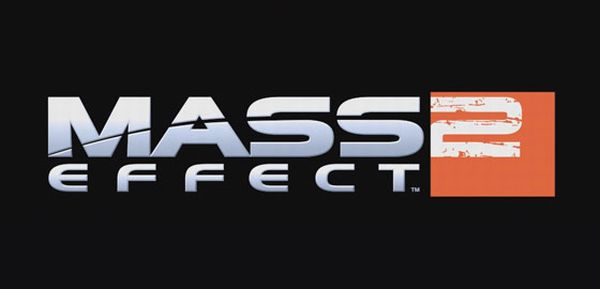
Like the majority of videogames, Mass Effect 2 is about saving the galaxy. Huge, terrifying aliens are coming to destroy all life and - surprise! - only your character can stop it. This is the ‘main quest’ of the game, and given the weight of it - the protection of all life in the galaxy - it should be your number one priority. Except there is nothing forcing you down this path. In fact, the game does the opposite; rather than forcing anything, it presents the player with an smorgasbord of ‘side quests’ and gives the player the option of how he or she wants to play the game.
Heavily influencing my playing of Mass Effect 2 is my experience playing The Elder Scrolls: Oblivion. I powered my way through the main quest of that game in the course of a couple of evenings. I completely avoided all of the side-quests or, indeed, anything that would take me from the path that would lead to me destroying all the oblivion gates and saving the world - I mean, who has time to join guilds and fight in gladiatorial arenas for sportI did actually complete the arena missions in Oblivion - one of the advantages of playing through the game the way I did was that I never got to a high enough level that the monsters were particularly difficult. The arena missions, then, were an easy way to make a lot of money in the game when there’s an evil demonic force sweeping the land? In the end, the game was fun, but after I completed it, I didn’t see much point in playing the rest of the game. The rest of the game being where everyone says the real enjoyment is to be had. In effect, I sabotaged my own experience of this game.
With this in mind, I’m doing things differently with Mass Effect 2. I’m trying to play each and every side-quest I can find. I’m scanning planets, talking to every random stranger, endorsing each and every shop on the citadel and trying to fuck just about every character I think the game will allow me to. Don’t get me wrong, I’m enjoying Mass Effect 2. These parts of the game are actually lots of fun and amazingly relaxing ways to kill a few hours. Except they’re completely at odds with the story. In most of the cut-scenes, my character shouts about how the reapers are coming and there’s no time for X - the galaxy is in danger and time is running out!
And yet, I waste hours - literally hours - scanning planets for minerals.
To make it worse, the game actually encourages this ridiculous disconnect. For example, your crew members will occasionally come to you with a problem that present new missions. If you choose to help them, completing these missions will increase their loyalty to you. When you first speak to them about these problems, there are two conversation options: “Sure, I’ll help” or “Sorry, there’s no time”. Within the context of the game, I’m left asking: why does that second choice even exist? If my hours of fucking around scanning planets has taught me anything, it’s that there is time. Lots and lots of time. Even still, if you agree to help your crew member, this mission just becomes another side-quest which you can tackle whenever you want. There’s nothing compelling you to go and deal with it right there (which is good, because in my game, Jacob’s dad has been in trouble for a couple of weeks now). Theoretically, you could say “sure, I’ll help”, completely ignore them and finish the main quest without any sort of punishment.
Within individual missions, too, there’s a lack of urgency or engagement. The game will tell you that someone is in trouble, that their life is hanging by a thread, but at the same time, the game actively encourages and rewards slow and methodical exploration. So, rather than rushing to the next area where the hostages are being held, you should first examine every nook and cranny, hack ‘datapads’, break into wall-safes, collect the ammo that has conveniently been left lying around the place. Take your time because the game, and the character who is supposedly in danger, will wait.
In my 22+ hours of playing Mass Effect 2, I have come across one - ONE - mission that was time-based and had a sense of urgency. A side-mission in which the player must stop a missile from launching within a set time limit. One mission out of maybe sixty.
I don’t mean to single out Mass Effect 2 with this complaint. Lots of other games suffer from the same problem. I finished the penultimate mission in the main quest of Fallout 3 before deciding that instead of facing the climax of that game and saving everyone, I would rather wander the wasteland with my dog and giant supermutant friend, hunting out all the side-questsUnlike Oblivion, it used to be that when you finished Fallout 3, you couldn’t go back and continue to play the game and explore the world - this was corrected in a subsequent patch. The Legend of Zelda: The Ocarina of Time is another example. You could rescue Zelda, or you could kick some chickens for hours and hours. In fact, it’s almost a genre staple: the RPG whose over-arching ‘main’ story is less important than the abundance of side-quests.
Other games have been more daring in their approach to the time mechanic and what it means for the narrative. The Legend of Zelda: Majora’s Mask, for example, has actual, time-based consequences, constantly increasing the tension in that game. Dead Rising is also built around time: the entire game takes place over the course of three days, and actions occur at certain times within that world (and, unlike BioShock, this game does give the player the option of non-participation. The player can simply sit around doing nothing, waiting for the game’s three-day timer to run out and for rescue to arrive. It’s not a great ending, but at least it’s catered for).
Having been disappointed by powering my way through Oblivion and disappointed by taking my time with Mass Effect 2, how should I tackle Dragon Age: Origins?
# Jul 20, 2010We Deal in Lead
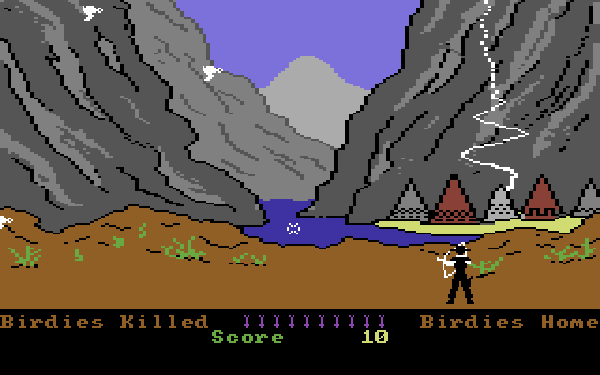
I’ve been thinking a lot about Kane, an early wild west game that came out on the Commodore 64 in the mid-80s. Actually, I doubt if it even counts as a ‘game’ by today’s standards. Really it was just four mini-games - shooting birds (or rather, ‘birdies’), riding a horse to the right, a shoot out, and then riding a horse to the left. The game wasn’t particularly flashy, nor was the narrative wrapper that supposedly connected these mini-games (essentially, the plot of High Noon - “Kane” being the name of Gary Cooper’s character in that movie).
Despite the flaws, I fucking loved that game.
I loved it because I was 10, and this was a game where I could pretend to be a cowboy. And when you’re a ten year old boy, all you want to do is to be a cowboy. For me, the small numbers of actions in the game actually added to the effect. I mean, what the hell else did cowboys do but shoot things and ride horses? That was just me, though. The Spectrum magazine, Crash, criticised the game for the limited amount of things you can do in the game, saying “it would be fun if there were about 10 more sections to battle through”.
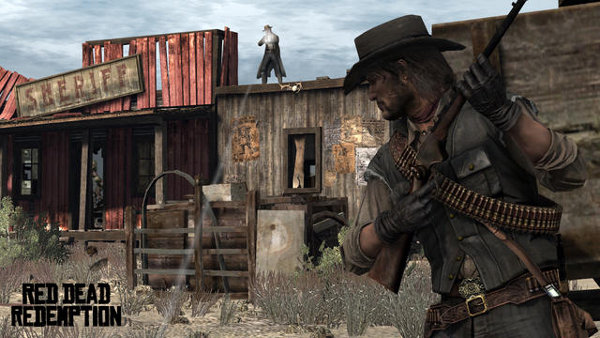
Playing through Rock Star’s Red Dead Redemption, I couldn’t help being reminded of Kane - one of the first games I ever played and definitely the first cowboy game I ever played - which then got me thinking about how far videogames have come. If you were to jump in a time machine and show this game to my ten-year old self (on a 60" HD LCD TV, natch), I can guarantee you I would have quite literally shit my pants.
While Kane was mostly played in static screens, with just four types of activity in the entire gameWell, two, if you want to be persnickety about the qualitative distinctions between riding left instead of right and shooting birds instead of dudes, there’s no shortage of activity in Red Dead Redemption. In my almost 35 hours of playing RDR, I never once felt bored or like I had nothing to do. There were always animals to hunt, outlaws to kill (and loot), horses to lasso and women to hogtie and place in front of a fast-approaching train. I love the amount and variety of possibilities that the game throws at the player. I’ve finished the story and I still have things to do, such as killing grizzly bears with my hunting knife.
What I love most about the Red Dead Redemption is the way it feels like a real, living world. I was always stumbling across little things, micro-stories that felt like they were happening completely independently of me and my actions. For example, while riding around Aurora Basin, hunting for bears, I spotted a man kneeling on the ground. I rode closer and saw that he was kneeling next to the body of a dead woman and bawling his eyes out. As I stood there, watching him cry, he took out a gun and shot himself in the head. I was completely stunned by this. I didn’t know what to do.
(I got off my horse and looted his body.)
I’m not particularly proud of my actions. All I’ll say is that we all have our own ways of dealing with grief and kleptomania is mine. But let’s just think about this: the amount of effort and number of man-hours put into crafting this one tiny, incidental scene in Red Dead Redemption probably outweighs the total amount of effort and number of man-hours put into the entirety of the making of Kane. And this was just a background action, something that would (apparently) happen whether I’d seen it or not. I could have missed it. I could have just as easily chosen to ride past the man without checking it out. It didn’t need to be there, but Rockstar put it in there because it fleshed out this world.
It’s easy to be jaded about these things (and I definitely felt a bit disappointed the second time I came across the suicide-man) but my goodness - we’ve really come a long way. No wonder my ten-year old self would have shit his pants.
# Jul 12, 2010
